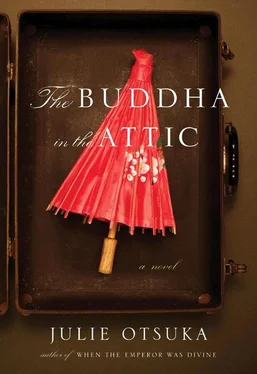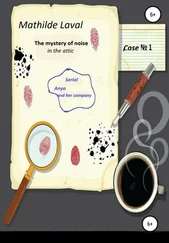A FEW OF THE THEM, we soon learn, are still with us. Gambling boss Hideo Kodama, a prisoner at the county jail. An expectant mother at the public hospital who is more than ten days overdue. That baby just doesn’t want to drop . A thirty-nine-year-old woman at the asylum for the insane who wanders the halls all day long in her nightgown and slippers, quietly mumbling to herself in Japanese, which nobody else can understand. The only words of English she knows are “water” and “Go home.” Twenty years ago, the doctor tells us, her two young children were killed in a fire while she was out in the fields with another man. Her husband took his own life the next day. Her lover left her. “And ever since then she just hasn’t been the same.” On the southern edge of town, at the Clearview Sanitorium, a twelve-year-old boy lies in a bed by a window, slowly dying of tuberculosis of the spine. His parents paid him one last visit the day before they left town and now he is all alone.
WITH EACH PASSING DAY the notices on the telephone poles grow increasingly faint. And then, one morning, there is not a single notice to be found, and for a moment the town feels oddly naked, and it is almost as if the Japanese were never here at all.
MORNING GLORIES BEGIN to grow wild in their gardens. Honeysuckle vines spread from one yard to the next. Beneath untended hedges, forgotten shovels rust. A lilac bush blossoms deep purple beneath the Oteros’ front window and then disappears the next day. A lemon tree is dug up over at the Sawadas’. Locks are jimmied off of front and back doors. Cars are stripped. Attics raided. Stovepipes pried loose. Boxes and trunks are hauled up out of basements and loaded into pickup trucks under cover of night. Doorknobs and lighting fixtures go missing. And out on Third Avenue, in the pawn and secondhand shops, exotic items from the Far East briefly surface before making their way into some of our homes. A stone lantern appears among the azaleas in a prizewinning garden on Mapleridge Road. A painted paper scroll replaces a picture of a naked bather in a living room on Elm. On block after block, Oriental rugs materialize beneath our feet. And on the west side of town, among the more fashionable set of young mothers who daily frequent the park, chopstick hair ornaments have suddenly become all the rage. “I try not to think about where they came from,” says one mother as she rocks her baby back and forth on a bench in the shade. “Sometimes it’s better not to know.”
FOR SEVERAL WEEKS some of us continue to hold out hope that the Japanese might return, because nobody said it would be forever. We look for them at the bus stop. At the florist. As we’re walking past the radio repair shop on Second Avenue formerly known as Nagamatsu Fish. We glance out our windows repeatedly just in case our gardeners have snuck back, unannounced, into our yards. There’s always a slight chance Yoshi might be out there raking leaves . We wonder if it wasn’t somehow all our fault. Perhaps we should have petitioned the mayor. The governor. The President himself. Please let them stay . Or simply knocked on their doors and offered to help. If only, we say to ourselves, we’d known . But the last time any of us saw Mr. Mori at the fruit stand he was just as friendly as ever. “He never mentioned to me that he was going away,” one woman says. Three days later, however, he was gone. A cashier at the Associated Market says that the day before the Japanese disappeared they were stocking up on food “like there was no tomorrow.” One woman, she says, bought more than twenty tins of Vienna sausage. “I didn’t think to ask her why.” Now, of course, she wishes she had. “I just want to know they’re all right.”
HERE AND THERE, in scattered mailboxes all throughout town, our first letters begin to arrive from the Japanese. A boy on Sycamore receives a short note from Ed Ikeda, who was once the fastest sprinter at Woodrow Wilson Junior High. Well, here we are at the reception center. I never saw so many Japanese in my life. Some people do nothing but sleep all afternoon long . A girl on Mulberry Street hears from her former classmate Jan. They are keeping us here for a little while longer and then they are sending us over the mountains. Hope to hear from you soon . The mayor’s wife receives a brief postcard from her loyal maid, Yuka, who showed up at her door on her second day off the boat. Don’t forget to air out the blankets at the end of the month . The wife of the assistant pastor at the United Methodist Church opens a letter addressed to her husband, which begins, Darling, am all right , and her whole world goes suddenly dark. Who is Hatsuko? Three blocks away, in a yellow house on Walnut, a nine-year-old boy reads a letter from his best friend, Lester— Did I leave my sweater in your room? —and for the next three nights he is unable to sleep.
PEOPLE BEGIN to demand answers. Did the Japanese go to the reception centers voluntarily, or under duress? What is their ultimate destination? Why were we not informed of their departure in advance? Who, if anyone, will intervene on their behalf? Are they innocent? Are they guilty? Are they even really gone? Because isn’t it odd that no one we know actually saw them leave? You’d think, says a member of the Home Front Commandos, that one of us would have seen something, heard something. “A warning shot. A muffled sob. A line of people disappearing into the night.” Perhaps, says a local air-raid warden, the Japanese are still with us, and are watching us from the shadows, scrutinizing our faces for signs of grief and remorse. Or maybe they’ve gone into hiding beneath the streets of our town and are plotting our eventual demise. Their letters, he points out, could easily have been faked. Their disappearance, he suggests, is a ruse. Our day of reckoning, he warns, is yet to come.
THE MAYOR URGES us all to be patient. “We’ll let you know what we can when we can,” he tells us. There was disloyalty on the part of some, time was short, and the need for action was great. The Japanese have left us willingly, we are told, and without rancor, per the President’s request. Their spirits remain high. Their appetite is good. Their resettlement is proceeding according to plan. These are, the mayor reminds us, extraordinary times. We are part of the battlefront now, and whatever must be done to defend the country must be done. “There will be some things that people will see,” he tells us. “And there will be some things that people won’t see. These things happen. And life goes on.”
THE FIRST BLAST of summer. Leaves droop on the branches of the magnolia trees. Sidewalks bake in the sun. Shouts fill the air as the final school bell rings and classes once more come to a close. Mothers’ hearts fill with despair. Not again , they groan. Some of them begin looking for new nannies to take care of their young children. Others advertise for new cooks. Many hire new gardeners and maids: sturdy young women from the Philippines, thin bearded Hindus, short squat Mexicans from Oaxaca who, though not always sober, are friendly enough— Buenos días , they say, and Sí, cómo no? —and willing to mow their lawns for cheap. Most take the plunge and drop off their laundry with the Chinese. And even though their linens might not come back to them perfectly pressed, and their hedges are sometimes unruly, they do not let it bother them, for their attention has turned to other things: the search for a missing boy named Henry, last seen balancing on a log at the edge of the woods (“He’s gone away to join the Japanese,” our children tell us), the capture of seven soldiers from our town in the battle of Corregidor, a lecture at the annual Pilgrim Mothers’ Club luncheon by recent Nazi refugee Dr. Raoul Aschendorff, entitled “Hitler: Today’s Napoleon?” which draws a standing-room-only crowd.
Читать дальше












